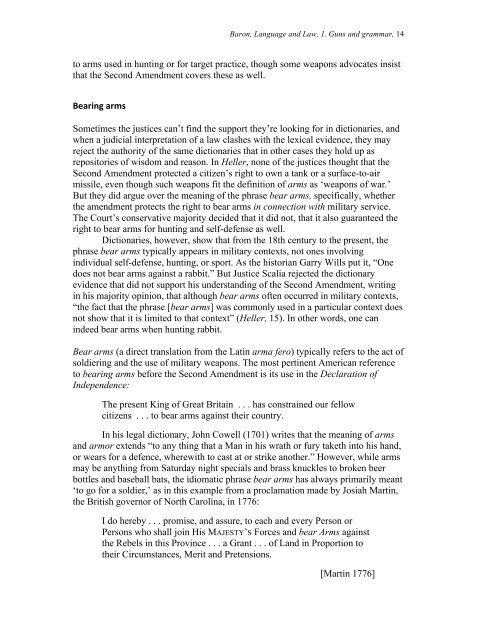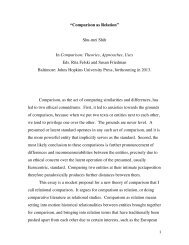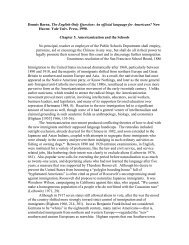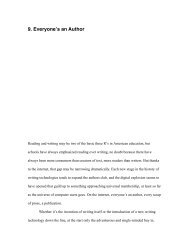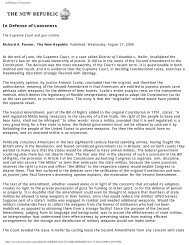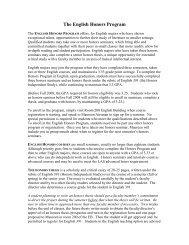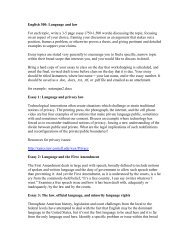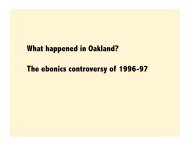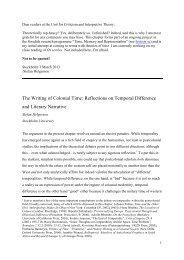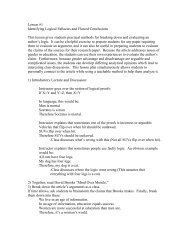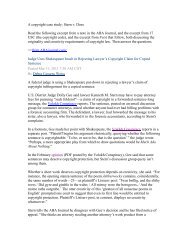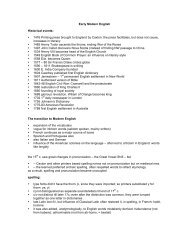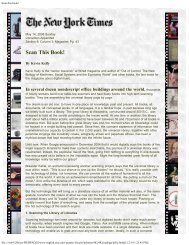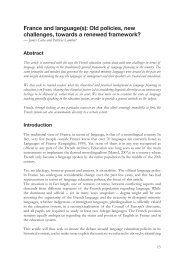1. Guns and Grammar: Determining what the Second ... - English
1. Guns and Grammar: Determining what the Second ... - English
1. Guns and Grammar: Determining what the Second ... - English
Create successful ePaper yourself
Turn your PDF publications into a flip-book with our unique Google optimized e-Paper software.
Baron, Language <strong>and</strong> Law, <strong>1.</strong> <strong>Guns</strong> <strong>and</strong> grammar, 14to arms used in hunting or for target practice, though some weapons advocates insistthat <strong>the</strong> <strong>Second</strong> Amendment covers <strong>the</strong>se as well.Bearing arms Sometimes <strong>the</strong> justices can’t find <strong>the</strong> support <strong>the</strong>y’re looking for in dictionaries, <strong>and</strong>when a judicial interpretation of a law clashes with <strong>the</strong> lexical evidence, <strong>the</strong>y mayreject <strong>the</strong> authority of <strong>the</strong> same dictionaries that in o<strong>the</strong>r cases <strong>the</strong>y hold up asrepositories of wisdom <strong>and</strong> reason. In Heller, none of <strong>the</strong> justices thought that <strong>the</strong><strong>Second</strong> Amendment protected a citizen’s right to own a tank or a surface-to-airmissile, even though such weapons fit <strong>the</strong> definition of arms as ‘weapons of war.’But <strong>the</strong>y did argue over <strong>the</strong> meaning of <strong>the</strong> phrase bear arms, specifically, whe<strong>the</strong>r<strong>the</strong> amendment protects <strong>the</strong> right to bear arms in connection with military service.The Court’s conservative majority decided that it did not, that it also guaranteed <strong>the</strong>right to bear arms for hunting <strong>and</strong> self-defense as well.Dictionaries, however, show that from <strong>the</strong> 18th century to <strong>the</strong> present, <strong>the</strong>phrase bear arms typically appears in military contexts, not ones involvingindividual self-defense, hunting, or sport. As <strong>the</strong> historian Garry Wills put it, “Onedoes not bear arms against a rabbit.” But Justice Scalia rejected <strong>the</strong> dictionaryevidence that did not support his underst<strong>and</strong>ing of <strong>the</strong> <strong>Second</strong> Amendment, writingin his majority opinion, that although bear arms often occurred in military contexts,“<strong>the</strong> fact that <strong>the</strong> phrase [bear arms] was commonly used in a particular context doesnot show that it is limited to that context” (Heller, 15). In o<strong>the</strong>r words, one canindeed bear arms when hunting rabbit.Bear arms (a direct translation from <strong>the</strong> Latin arma fero) typically refers to <strong>the</strong> act ofsoldiering <strong>and</strong> <strong>the</strong> use of military weapons. The most pertinent American referenceto bearing arms before <strong>the</strong> <strong>Second</strong> Amendment is its use in <strong>the</strong> Declaration ofIndependence:The present King of Great Britain . . . has constrained our fellowcitizens . . . to bear arms against <strong>the</strong>ir country.In his legal dictionary, John Cowell (1701) writes that <strong>the</strong> meaning of arms<strong>and</strong> armor extends “to any thing that a Man in his wrath or fury taketh into his h<strong>and</strong>,or wears for a defence, wherewith to cast at or strike ano<strong>the</strong>r.” However, while armsmay be anything from Saturday night specials <strong>and</strong> brass knuckles to broken beerbottles <strong>and</strong> baseball bats, <strong>the</strong> idiomatic phrase bear arms has always primarily meant‘to go for a soldier,’ as in this example from a proclamation made by Josiah Martin,<strong>the</strong> British governor of North Carolina, in 1776:I do hereby . . . promise, <strong>and</strong> assure, to each <strong>and</strong> every Person orPersons who shall join His MAJESTY’S Forces <strong>and</strong> bear Arms against<strong>the</strong> Rebels in this Province . . . a Grant . . . of L<strong>and</strong> in Proportion to<strong>the</strong>ir Circumstances, Merit <strong>and</strong> Pretensions.[Martin 1776]


